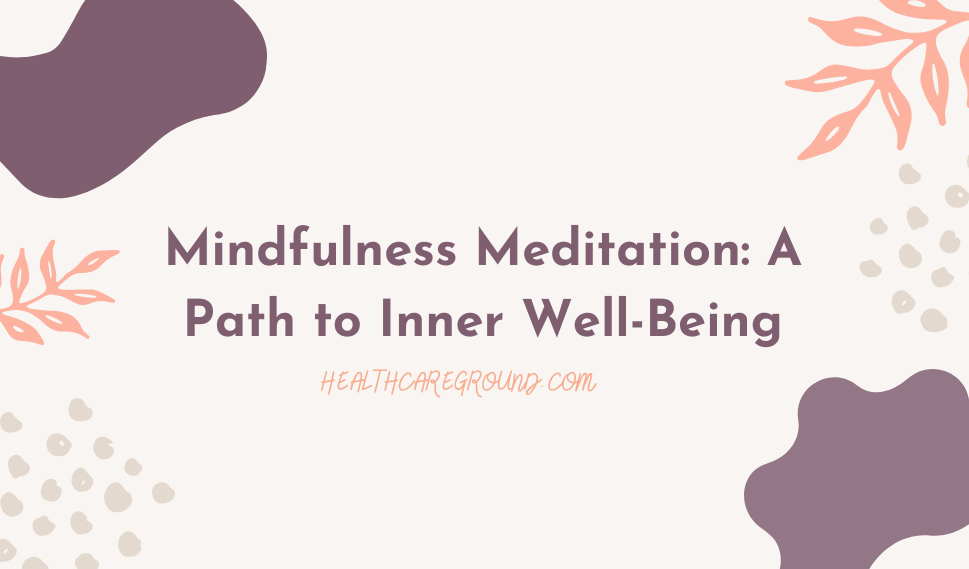In the hustle and bustle of modern life, finding inner peace and well-being can often seem like an elusive goal. The constant barrage of responsibilities, distractions, and stressors can leave us feeling overwhelmed and disconnected from our true selves. Mindfulness meditation offers a profound way to navigate this turbulent terrain, providing a path to inner well-being and a deeper connection with ourselves. In this article, we will explore the practice of mindfulness meditation, its benefits for mental and emotional health, and practical tips for incorporating it into your daily life.
Understanding Mindfulness Meditation
Mindfulness meditation is a centuries-old practice rooted in Buddhist traditions but has found its way into mainstream culture as a powerful tool for promoting well-being. At its core, mindfulness is the practice of paying purposeful and non-judgmental attention to the present moment. It involves observing your thoughts, feelings, bodily sensations, and the environment around you without attempting to change or judge them.
The key components of mindfulness meditation include:
1. Focus: Concentrating your attention on a specific anchor, such as your breath, bodily sensations, or a chosen mantra.
2. Awareness: Observing thoughts, emotions, and physical sensations as they arise, without judgment or attachment.
3. Acceptance: Embracing whatever you experience during meditation with an attitude of acceptance and non-resistance.
4. Non-Attachment: Allowing thoughts and emotions to come and go without becoming entangled or identified with them.
The Benefits of Mindfulness Meditation
The practice of mindfulness meditation offers a wide range of benefits that extend beyond inner peace and emotional well-being. Research in psychology and neuroscience has uncovered many of these advantages, making it a compelling practice for those seeking to improve their mental and emotional health.
1. Stress Reduction: Mindfulness meditation is renowned for its ability to reduce stress. By fostering awareness and acceptance, it helps individuals manage the impact of stressful situations more effectively.
2. Improved Emotional Regulation: Regular practice can enhance emotional regulation, allowing you to respond to challenging situations with greater equanimity and less reactivity.
3. Enhanced Focus and Concentration: Mindfulness meditation strengthens your attentional muscles, enabling you to stay present and focused for more extended periods in everyday life.
4. Increased Self-Awareness: The practice encourages self-reflection and introspection, leading to a deeper understanding of your thoughts, emotions, and behavior patterns.
5. Better Mental Health: Mindfulness meditation has been linked to reduced symptoms of anxiety, depression, and post-traumatic stress disorder (PTSD).
6. Enhanced Resilience: By training your mind to be more present and adaptable, mindfulness can help you bounce back from adversity more effectively.
7. Improved Relationships: The practice can lead to better interpersonal relationships by fostering empathy, active listening, and non-reactive communication.
8. Physical Health Benefits: Mindfulness meditation has been associated with improved sleep, lower blood pressure, and enhanced immune system function.
Incorporating Mindfulness Meditation Into Your Life
Integrating mindfulness meditation into your daily routine doesn’t require an elaborate setup or a significant time commitment. Here are practical steps to get started:
1. Start Small: Begin with short sessions, such as 5-10 minutes per day. As you become more comfortable with the practice, gradually extend the duration.
2. Create a Sacred Space: Find a quiet, comfortable space where you can meditate without distractions. You don’t need a dedicated meditation room; a quiet corner or chair will suffice.
3. Choose Your Anchor: Select an anchor for your meditation, such as your breath, a mantra, or bodily sensations. This will be your point of focus during the practice.
4. Set Aside Time: Dedicate a specific time each day for your meditation practice. Consistency is more important than duration.
5. Observe Non-Judgmentally: As you meditate, thoughts and emotions will arise. Observe them without judgment or attachment, letting them come and go like clouds passing in the sky.
6. Return to Your Anchor: If your mind wanders (which is entirely natural), gently redirect your focus to your chosen anchor, such as your breath.
7. Extend Mindfulness to Daily Life: As you become more proficient in mindfulness, try to carry this presence into everyday activities. Practice mindful eating, walking, and listening.
8. Use Guided Meditations: If you’re new to mindfulness meditation, consider using guided meditation apps or recordings to help you get started.
9. Be Patient and Kind to Yourself: Mindfulness is a skill that develops over time. Be patient with yourself and approach your practice with self-compassion.
Common Challenges and Solutions
Like any practice, mindfulness meditation can pose challenges. Here are some common obstacles and how to address them:
1. Restlessness: If you find it challenging to sit still, try incorporating mindfulness into movement practices like yoga or tai chi.
2. Impatience: It’s natural to want quick results, but mindfulness is a journey. Practice patience and trust the process.
3. Mind Wandering: When your mind wanders, gently bring your attention back to your anchor without self-criticism.
4. Resistance: Some days, you might encounter resistance to meditating. Explore this resistance with curiosity rather than avoidance.
5. Lack of Time: Even a few minutes of mindfulness can be beneficial. Prioritize your well-being by carving out small pockets of time.
Conclusion
Mindfulness meditation is a transformative practice that offers a path to inner well-being, emotional resilience, and a deeper connection with yourself. Its benefits extend to mental, emotional, and even physical health, making it a valuable tool for navigating the complexities of modern life.
By incorporating mindfulness into your daily routine and approaching it with patience and self-compassion, you can unlock the profound potential for greater peace, clarity, and well-being within yourself. As you embark on this journey, remember that mindfulness is not about escaping the challenges of life but about learning to meet them with a centered and open heart.

